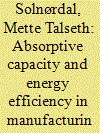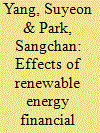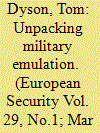|
|
|
Sort Order |
|
|
|
Items / Page
|
|
|
|
|
|
|
| Srl | Item |
| 1 |
ID:
167025


|
|
|
|
|
| Summary/Abstract |
Increased energy efficiency (EE) in manufacturing firms is important for confronting climate challenges. However, the information barrier is considered a major restriction on EE innovation. Building on the theory of absorptive capacity and the current EE literature, we argue that this barrier relates to firms' ability to assimilate and exploit information. Thus, this study's objective is to analyse firms' knowledge characteristics as determinants of EE innovation. We perform logit regressions using a Norwegian panel dataset for the period 2010–2014. The results are based on statistical correlations between data points that have potential uncertainties. Still, the main implications from our study are that prior knowledge, in terms of higher educated workforce, knowledge development, in terms of R&D capacity, and external knowledge cooperation, such as cooperation with universities and competitors, increase firms' pursuit of EE innovation. Further, the results also imply that there is an interaction effect between higher educated workforce and collaboration with universities. These results suggest that policy makers should consider firms' ability to assimilate and exploit information. This can be done by providing information according to firms' needs and absorptive capacity, and offering possibilities for firms to increase this capacity.
|
|
|
|
|
|
|
|
|
|
|
|
|
|
|
|
| 2 |
ID:
175234


|
|
|
|
|
| Summary/Abstract |
This paper seeks to analyse the adoption of Energy Efficiency Measures in non-residential buildings. Based on the concepts of agency theory and absorptive capacity, the propensity of Micro-, Small- and Medium-sized Enterprises in Portugal to adopt energy efficiency in lighting, insulation, and the replacement and operation of heating, was evaluated. To achieve this, an online survey was carried out, and the resultant data was treated using Probit models. The main findings suggest that absorptive capacity factors are a key reason for adopting more efficient and profitable technologies. Policymakers should provide assistance and information to the managers of these enterprises regarding the benefits of energy efficiency measures. Additionally, this paper shows that subsidiary enterprises are more likely to adopt energy efficiency measures. Although subsidiaries suffer pressures due to agency theory factors, they may also benefit from knowledge transfers from their parent enterprises. Most of the decisions and barriers considered by enterprises are not based on audits or the advice of energy management professionals, since more than 65% of the respondents have never performed an energy audit, and over 82% do not have an energy manager.
|
|
|
|
|
|
|
|
|
|
|
|
|
|
|
|
| 3 |
ID:
175574


|
|
|
|
|
| Summary/Abstract |
This paper empirically investigates the impact of China's outward foreign direct investment (OFDI) on its export sophistication. Using a provincial‐level panel dataset and applying fixed effects and instrumental variable regression techniques, the study finds that, on average, OFDI has no significant impact on China's export sophistication. However, after the full sample is divided into different regions, the study finds that OFDI has a positive and significant impact on export sophistication in the developed coastal region, but no such impact is observed in the less developed inland regions. Further investigation using a panel threshold model reveals that only when GDP, per capita GDP, human capital, and the research and development intensity of a home economy reach a certain level can OFDI promote export sophistication. The findings suggest that accelerating eco nomic development and increasing absorptive capacity can facilitate the contribution of OFDI to China's export sophistication.
|
|
|
|
|
|
|
|
|
|
|
|
|
|
|
|
| 4 |
ID:
112731


|
|
|
|
|
| Publication |
2012.
|
| Summary/Abstract |
In many countries inward foreign direct investment (FDI) typically concentrates in a few regions. However, there is little empirical evidence on whether spatially concentrated FDI boosts economic growth in other regions within the same country. We use a dataset that covers 96% of Chinese cities from 1996 to 2004 and find that "inter-regional spillovers" from FDI concentrated in China's coastal cities have a positive and significant effect on the growth of inland cities. In addition, an inland city's industrial development affects its absorptive capacity to gain such inter-regional spillovers from coastal FDI.
|
|
|
|
|
|
|
|
|
|
|
|
|
|
|
|
| 5 |
ID:
174985


|
|
|
|
|
| Summary/Abstract |
Prior work has focused almost exclusively on the direct effect of external resources such as official development assistance (ODA) on renewable electricity generation in developing countries. We depart from this approach by suggesting that the influence of renewable energy (RE) ODA is contingent upon a developing country's internal capabilities to effectively utilize external resources. More specifically, we focus on RE financial incentive policy and political democracy to measure such capabilities and examine whether and how they moderate the relationship between RE ODA and renewable electricity generation. Analyzing panel data of 98 developing countries between 2000 and 2014, we find that the main effect of RE ODA significantly varies depending on the implementation of RE financial incentive policy and degree of political democracy. Our results add theoretical insight for studies on ODA effectiveness and generate policy implications for designing and disbursing renewable energy aid.
|
|
|
|
|
|
|
|
|
|
|
|
|
|
|
|
| 6 |
ID:
105277


|
|
|
|
|
| Publication |
2011.
|
| Summary/Abstract |
Focusing on Japanese, Korean, Taiwanese, and Chinese firms in the manufacturing sector, this paper examines productivity catch-up at the firm level using the distance from the technology frontier as a direct measure of the potential for catch-up. We also examine the role of absorptive capacity for technological catch-up by including variables such as R&D expenditure and foreign ownership in our empirical estimation. We find that the national frontier has a stronger pull on domestic firms than the regional frontier, which is in line with findings by Bartelsman, Haskel, and Martin (2008). This result indicates that policies to raise the technology level of national frontier firms are beneficial for all firms in that country.
|
|
|
|
|
|
|
|
|
|
|
|
|
|
|
|
| 7 |
ID:
185342


|
|
|
|
|
| Summary/Abstract |
This article examines the development and performance of formal organisational learning processes in the Ukrainian Armed Forces (UAF) during the Donbas War (2014-present). Through original empirical research conducted with UAF personnel and documentary analysis, the article develops understanding about the detail of UAF lessons-learned processes and their effectiveness in helping to recalibrate UAF activities to operational demands. The article finds that the performance of UAF lessons-learned processes during the Donbas War has, on the whole, been poor. Since the escalation of Russian aggression in 2014, some positive steps which have been taken to implement best-practices in UAF lessons-learned processes. However, the article uncovers a number of organisational activities, structures and processes which could be improved to weaken the negative impact of bureaucratic politics and organisational culture on learning. It concludes with recommendations for the further development of UAF lessons-learned processes. The article highlights the particular importance of improving the capacity of the civilian leadership to exert effective oversight of military learning and of US and NATO support for these efforts.
|
|
|
|
|
|
|
|
|
|
|
|
|
|
|
|
| 8 |
ID:
175458


|
|
|
|
|
| Summary/Abstract |
The post-Cold War era has witnessed the widespread development of lessons-learned processes within NATO member-states. However, practitioner guidance and military innovation studies are yet to properly investigate the insights of management studies about best-practice in lessons-learned processes. In particular, they have failed to identify the activities which enable militaries to “transform” knowledge, by effectively combining new knowledge with existing organisational knowledge. Drawing upon the academic literature on cross-functional teams and original interview research, this article examines the organisational activities which improve the crucial “remedial action” phase of lessons-learned processes. It breaks new ground by identifying six key dimensions of lessons-learned process cross-functional teams and the organisational activities which enhance their performance. In doing so, the article improves understanding about the team processes and wider organisational activities which shape lessons-learned process effectiveness. It also examines the challenges associated with encouraging well-informed oversight of lessons-learned processes by the civilian and military leadership. The article concludes by identifying a number of important research agendas on lessons-learned processes.
|
|
|
|
|
|
|
|
|
|
|
|
|
|
|
|
| 9 |
ID:
143432


|
|
|
|
|
| Summary/Abstract |
The present study uses firm survey data of 1033 manufacturing firms operating in Ethiopia in 2011 to examine the impact of Chinese outbound direct investment on the productivity of domestic firms. Particularly, we attempt to answer two questions. Firstly, are Chinese-owned (henceforth foreign) firms more productive than local ones? Secondly, does the presence of foreign firms generate technology spillovers on domestic firms operating in the same industry? Our empirical results show that foreign firms are more productive and that their presence has different spillover effects on the productivity of domestic firms. In particular, we find that domestic firms with higher absorptive capacity experience positive spillovers, while those with low absorptive capacity witness negative spillover. We also find that small firms and non-exporting firms benefit more from spillovers than do other types of domestic firms. In this study, instrumental variables are used to address the potential endogeneity between foreign firm presence and domestic firm productivity.
|
|
|
|
|
|
|
|
|
|
|
|
|
|
|
|
| 10 |
ID:
173943


|
|
|
|
|
| Summary/Abstract |
Which organisational activities promote effective military emulation? Which variables facilitate and impede the emergence of these activities? Drawing upon the academic literatures on military change and management studies, as well as semi-structured interviews within the British and German militaries, this article identifies five key organisational activities which promote effective inter-organisational doctrinal learning. In doing so, the article improves understanding of the contribution that management studies can make to multi-disciplinary scholarship on military learning. The article examines the variables which facilitate the emergence of activities which support effective inter-organisational doctrinal learning through a case study of Bundeswehr doctrinal absorptive capacity during ISAF. It also explores the impact of these activities on doctrine development. The article demonstrates the crucial importance of active and well-informed civilian oversight of the activities which support military learning.
|
|
|
|
|
|
|
|
|
|
|
|
|
|
|
|
|
|
|
|
|